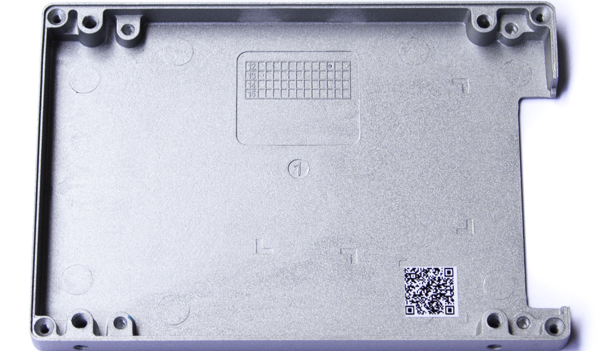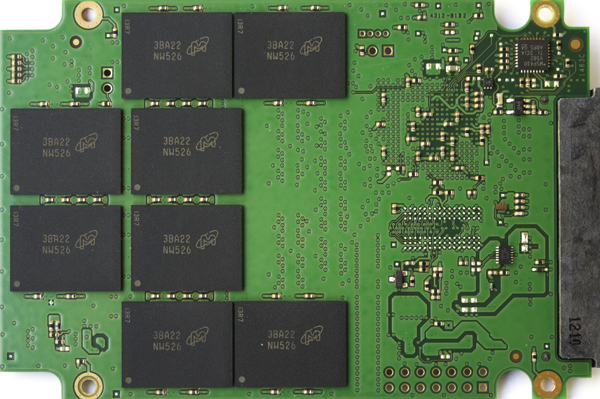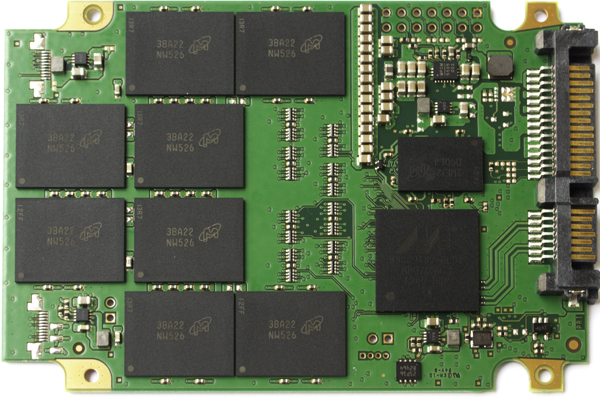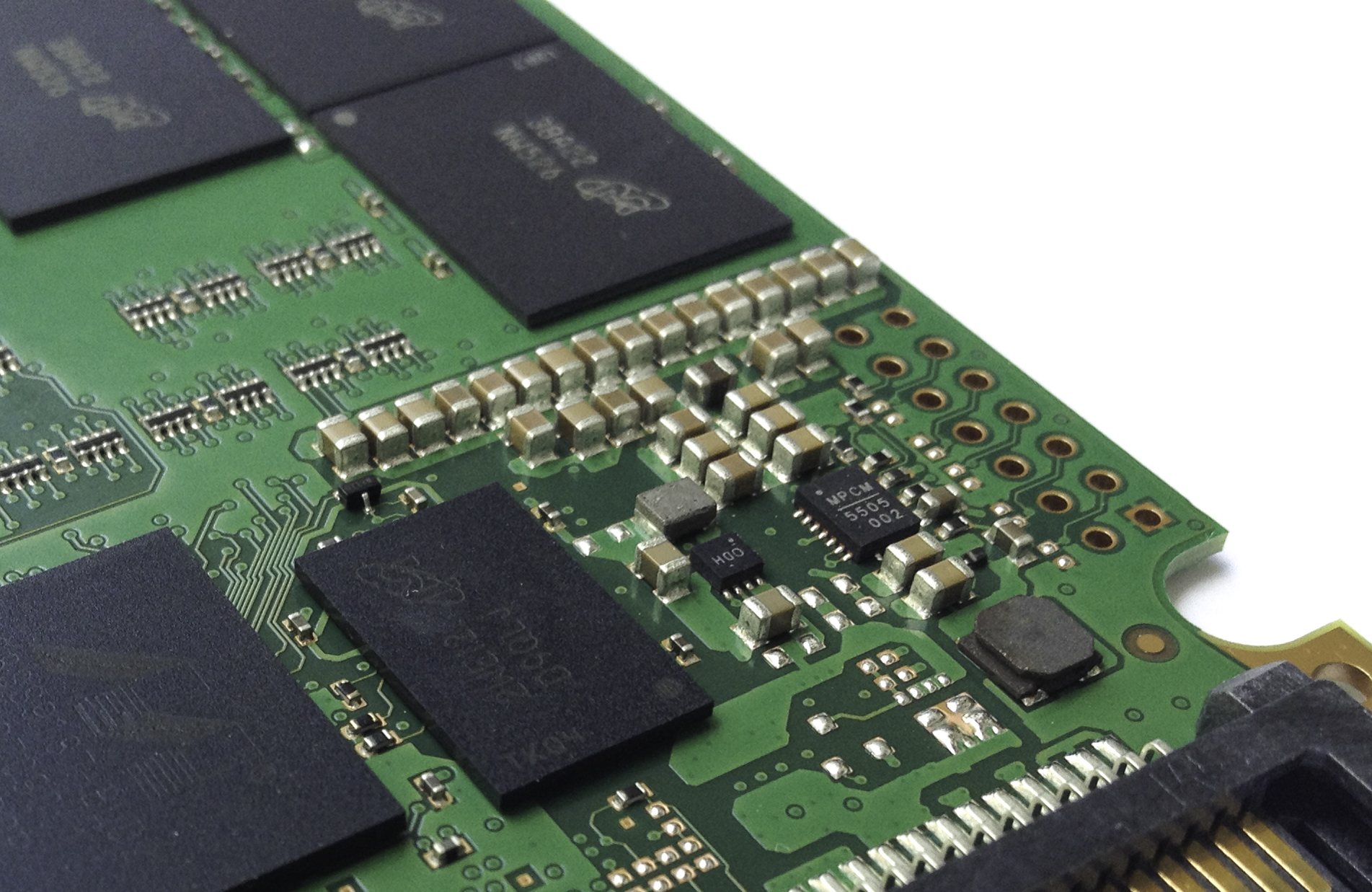SSD Deathmatch: Crucial's M500 Vs. Samsung's 840 EVO
Micron's consumer products division, Crucial, wasn't the first brand to introduce a 1 TB SSD. But it was the first to sell one for less than a fortune, and it sports some snazzy new features to boot. We got our hands on the entire line-up to test.
Inside Of Crucial's M500 SSD
Compared to the pentalobe and Torx screws that many drives employ, the four Phillips-head screws holding the M500's chassis together are easily removed.
The bottom of the enclosure is substantial, which gives the drive some heft. The thick casing also helps transfer some heat away from the SSD's internals. You don't want the flash inside getting too warm; that can throw off expected voltage levels, wreaking havoc on endurance (this is why thermal throttling is an important safeguard nowadays). Should the M500 get too hot, the controller will slow write performance above 70 degrees Celsius.
With the PCB freed from its shell, the hardware is fair game for poking and prodding. Pictured above is the 480 GB drive, with eight packages per side. Each hosts two 128 Gb (16 GB) dies. The math there is pretty easy: every package adds 32 GB to this M500's capacity. Micron puts abbreviated codes on its NAND, but running it through the company's decoder gives us a traditional part number: MT29F256G08CECABH6.
Up top, we have Marvell's 88SS9187 BLK2 controller. As the successor to the '9174, which drove Crucial's m4, Plextor's M3s, Intel's SSD 510, and OCZ's Octane, the '9187 adds NAND redundancy features, queued TRIM commands, and even a little extra horsepower. It also supports up to 4 GB of DDR3 cache. Not that these drives need that much, but hey, maybe someday...
Crucial uses that controller with its custom firmware to implement RAIN (Micron's trade name for cross-die redundancy). Like some SandForce-based drives, this technology sets some NAND aside for parity. If one part of a die fails, the controller recovers and rebuilds the data stored in that location. It does sap some capacity (basically, one byte out of every 16), but the feature is a good trade-off in most situations. Some SandForce partners steered clear of the similar RAISE capability, opting instead to make that space accessible for a better price per gigabyte of capacity or use it to over-provision.
The M500's implementation of RAIN cannot recover from an entire die failing prematurely. Whole die failures do happen, unfortunately. But if just part craps out on you (say, one of the constituent planes that make up a die) the M500's RAIN feature should have your back.
This is the bank of itty-bitty capacitors that enables power loss protection (or PLP, if you please). This reliability-oriented value-add can be implemented a couple of different ways. The end goal is to protect information in the volatile write cache should your power go out suddenly. Once those bits hit the flash, they're safe. But they're vulnerable in the DDR3 DRAM and controller. PLP is purposed with safeguarding the entire data path.
Get Tom's Hardware's best news and in-depth reviews, straight to your inbox.
Supercapacitors are basically big honkin' batteries, like a mini-UPS on the PCB. They've fallen out of favor over the past few years though, and many drives rely on a series of tantalum caps to keep data flowing when power to the SSD is interrupted. Crucial goes with a slightly different approach on the M500, though. Armed with a series of small caps, the controller flushes most of what's in the cache, while using "NAND tricks" to make up any deficit. At any given time, there's only 1 to 4 MB of user data in the DRAM, so it's not like the hardware is trying to write the Great American Novel in a handful of microseconds.
Current page: Inside Of Crucial's M500 SSD
Prev Page Crucial's New m4 (Plus 496) Gets Reviewed Next Page Test Setup And Benchmarks-
Someone Somewhere I think you mixed up the axis on the read vs write delay graph. It doesn't agree with the individual ones after, or the writeup.Reply -
Someone Somewhere Even 3bpc SSDs should last you a good ten years...Reply
The SSD 840 is rated for 1000 P/E cycles, though it's been seen doing more like ~3000. At 10GB/day, a 240GB would last for 24,000 days, or about 766 years, and that's using the 1K figure.
You're free to waste money if you want, but SLC now has little place outside write-heavy DB storage.
EDIT: Screwed up by an order of magnitude. -
cryan Reply11306005 said:I think you mixed up the axis on the read vs write delay graph. It doesn't agree with the individual ones after, or the writeup.
You are totally correct! You win a gold star, because I didn't even notice. Thanks for catching it, and it should be fixed now.
Regards,
Christopher Ryan
-
cryan Reply11306034 said:I would only buy SSD that uses SLC memory. I dont wan't to buy new drive every year or so.
Not only are consumer workloads completely gentle on SSDs, but modern controllers are super awesome at expanding NAND longevity. I was able to burn through 3000+ PE cycles on the Samsung 840 last year, and it only is rated at 1,000 PE cycles or so. You'd have to put almost 1 TB a day on a 120 GB Samsung 840 TLC to kill it in a year, assuming it didn't die from something else first.
Regards,
Christopher Ryan
-
Someone Somewhere I'd like to see some sources on that - for starters, I don't think the 840 has been out for a year, and it was the first to commercialize 3bpc NAND.Reply
You may be thinking of the controller failures some of the Sandforce drives had, which are completely unrelated to the type of NAND used. -
mironso Well, I must agree with Someone Somewhere. I would also like to see sources for this statement: "Yes, in theory they last 10 years, in practise they last a year or so.".Reply
I would like to see, can TH use SSD put this 10GB/day and see for how long it will work.
After this I read this article, I think that Crucial's M500 hit the jackpot. Will see Samsung's response. And that's very good for end consumer. -
edlivian It was sad that they did not include the samsung 830 128gb and crucial m4 128gb in the results, those were the most popular ssd last year.Reply -
Someone Somewhere You can also find tens of thousands of people not complaining about their SSD failing. It's called selection bias.Reply
Show me a report with a reasonable sample size (more than a couple of dozen drives) that says they have >50% annual failures.
A couple of years ago Tom's posted this: http://www.tomshardware.com/reviews/ssd-reliability-failure-rate,2923.html
The majority of failures were firmware-caused by early Sandforce drives. That's gone now.
EDIT: Missed your post. First off, that's a perfect example of self-selection. Secondly, those who buy multiple SSDs will appear to have n times the actual failure rate, because if any fail they all appear to fail. Thirdly, that has nothing to do with whether or not it is a 1bpc or 3 bpc SSD - that's what you started off with.
This doesn't fix the problem of audience self-selection
-
Someone Somewhere You were however trying to stop other people buying them...Reply
Sounds a bit like a sore loser argument, unfortunately.
SSDs aren't perfect, but they generally do live long enough to not be a problem. Most of the failures have been overcome by now too.
Just realised there's an error in my original post - off by a factor of ten. Should have been 66 years. -
warmon6 Reply11306841 said:I am not talking about Samsung SSD-s, I am talking about SSDs in general. And I am not going to provide any sources because SSD fail all the time after a year or so. That is the raility. You can find, on the internet, people complaining abouth their SSD failing. There are a lot of them...
Also, SLC based SSD-s are usually "enterprise", so they are designed for reliability and not performance, and they don't use some bollocks, overclocked to the point of failure, controllers. And have better optimised firmware...
Tell that to all the people on this forum still running intel X-25M that launched all the way back in 2008 and my Samsung 830 that's been working just fine for over a year.......
See what you're paying attention too is the loudest group of ssd owners. The owners that have failed ssd's.
See it's the classic "if someone has a problem, there going to be the one that you hear and the quiet group, isn't having the problem" issue.
Those that dont have issues (such as myself) dont mention about our ssds and is probably complaining about something else that has failed.






